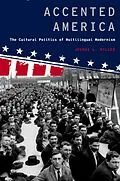American literary works written in the heyday of modernism between the 1890s and 1940s were playfully, painfully, and ambivalently engaged with language politics. The immigrant waves of the period fed into writers' aesthetic experimentation; their works, in turn, rewired ideas about national identity along with literary form. Accented America looks at the long history of English-Only Americanism-the political claim that U.S. citizens must speak a singular, shared American tongue-and traces its action in the language workshop that is literature. The broadly multi-ethnic set of writers brought into conversation here-including Gertrude Stein, Jean Toomer, Henry Roth, Nella Larsen, John Dos Passos, Lionel Trilling, Américo Paredes, and Carlos Bulosan-reflect the massive demographic shifts taking place during the interwar years. These authors share an acute awareness of linguistic standardization while also following the defamiliarizing sway produced by experimentation with invented and improper literary vernaculars. Rather than confirming the powerfully seductive subtext of monolingualism-that those who speak alike are ethically and politically likeminded-multilingual modernists compose literature that speaks to a country of synthetic syntaxes, singular hybrids, and enduring strangeness.
Autorentext
Joshua L. Miller is Associate Professor of English Language and Literature at the University of Michigan.
Inhalt
Series Editors' Foreword Introduction: "every kind of mixing" Chapter One: Reinventing vox Americana Language, Hygiene, and National Security Mencken and the Cultural Work of Polemical Philology Contemporary "American" as Standard Vernacular Chapter Two: Documenting "American" "A Standardization Not Imposed But Voluntarily Accepted" Chapter Three: Foreignizing "english" The Making of Americans' Speech: Stein's Aural "english" Multilingual Fusion and the Limits of Cosmopolitan Expression: Dos Passos's U.S.A. Locutions of Dislocation and the Political Uses of Despair Chapter Four: Vernacularizing Silence "Flesh of their Language" "Been Shapin Words T Fit M Soul": Toomer's Cane Chapter Five: Translating "Englitch" "Kent'cha Tuck Englitch?": Linguistic Dissonance in Call It Sleep "The Purpose of Jewish Life is Cultural, is it not?": The Politics of Trilling's Style The Return of the Depressed Chapter Six: Spanglicizing Modernism U.S. Empire and Imposed Syntax "Born a Foreigner in his Native Land": Paredes and Binational Speech "Citizenship, then, is the basis of all this misunderstanding?": Bulosan's America Idioms of Annexation Conclusion: "say something american if you dare"
